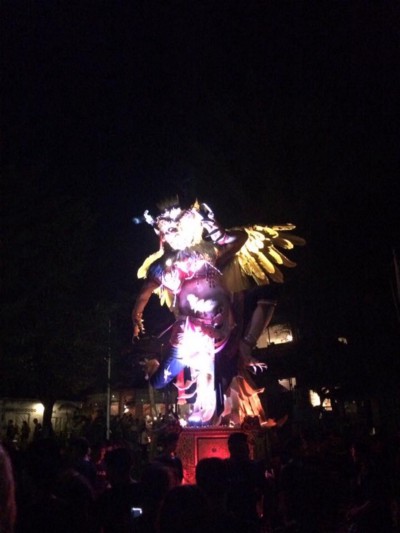Bali: Bunting, Bono, burning and silence
Ceremonial year-turning on an Indonesian island.
Sometimes the gods are with you and it’s good, sometimes they are and it’s not. Whether by calendrical coincidence or celestial guidance, we ended up in Bali for a festival that combines elements of Halloween, Bonfire Night, New Year, a county fair and a nice quiet day off. These are all good things.
Turns out that the Balinese New Year (today, folks) is marked by a Hindu ceremonial day called Nyepi. As with most cultures, the old year is kicked out of the door with a party, but here it’s a party with a difference. Under the last dusk of the year, the locals gather in a public place — in Ubud it’s the football field, fringed by the usual globally-recognisable concession stalls selling balloons and illuminated plastic tat — and are joined by their demons.
Not a great pitch, but always a heartwarming sight, particularly bang in the middle of town. The Reds got their arses handed to them by the multi-coloureds, one of whom scored a left-foot top-bins worldy.
The ogoh-ogoh are fantastical effigies, some so sizeable (up to about 20ft) that they require pole-bearing harbingers to walk before them lifting the power lines that cross the streets. Representing the frequently negative energies of humans — sprites for spirits — the ogoh-ogoh are paraded from the local temples and workshops where they have been created, in a friendly rivalry creatively expelling the evil that our species has produced during the year.
Following a period of admiration by cameraphone and some pantomimic charging around, the effigies are then paraded slowly back through the town and, after some drawn-out son-et-lumiere, ceremonially destroyed. If you’re lucky this will be a good old-fashioned burnin’; although this can sometimes be ruled out for fear of endangering nearby buildings, it doesn’t mean the demons find salvation in bureaucracy (elfin safety?) — they are always somehow ceremonially destroyed, sometimes by drowning in the sea.
And so to Nyepi itself. When Bono sang “all is quiet on New Year’s Day”, the beshaded burk wasn’t warbling about Bali but nowhere can his words be truer. See, the big idea is that the evil spirits expunged the previous evening are flying over the island seeking humans to inhabit. Therefore, from sun-up to sun-up, Bali hides by observing a Day of Silence. The devoutly religious make no noise at all, but nobody on the island is allowed to make more than a murmur. And you can forget about playing or imbibing music: sorry, Bono, your Vox cannot be heard. TV and radio stations are similarly silenced.
Furthermore, nobody is allowed out. This isn’t to say you’re locked indoors: most Bali homesteads are built around courtyards, into and around which the inhabitants can mooch, many inevitably drawn into the supracultural escape pod that is the smartphone. (I’m also happy to report that hotel visitors can lie quietly beside a pool into which they may slip but not jump.) But the law is taken seriously, and you’re not allowed through the front door — not that there would be many places to go. All shops close, as does the airport, and the streets are patrolled by security guards firmly pointing any wanderers back home.
As night falls, in its usual equatorial haste, lights are kept to a minimum: one per room, grudgingly. On nocturnal satellite photos, silently sequestered Bali is imperceptible in the inky ocean. The island is pretty much the last outpost of Hindu prevalence in the predominantly Muslim, quarter-billion-population country of Indonesia; if the bad spirits flying overhead bog off to neighbouring Java, that’s their business.
The natural and uncoincidental byproduct of this reversal from modernity is a sojourn into introspection — a state eagerly chased by practising Hindus and gap-year backpackers alike. There’s no better day to try a spot of meditation, whether that comes to you via cross-legged zone-outs, long books or simply sitting quietly with your thoughts. We modern humans do tend to dash around a lot, so it’s quite pleasant to be forced to sit, shush and think.
And how old is this curious ceremony of the Ogoh-ogoh, designed to help us improve our basest desires? Younger than Thatcherism: the first ogoh-ogoh parade was held in the 1980s. Still, traditions can quickly take root in a calendar — think of Prince Albert’s Christmas tree — particularly when they serve a wider purpose. The Bali bombings of 2002 and 2005, when Islamists attacked the tourist hotspot Kuta, may have strengthened Hinduism. I’m not here to referee between other people’s imaginary friends, especially when those people pervert wholesome religions with inhumanly destructive behaviour. But it seems to me that all hatred simply ladles on the need for the expulsion of bad spirits and a touch of introspection.
Originally published on Facebook, 28 Mar 2017.




















